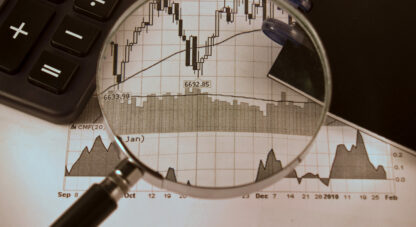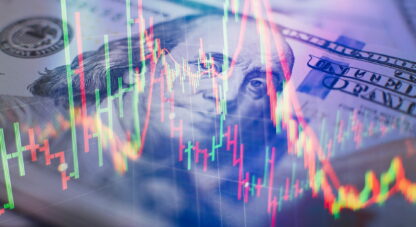Podcast: Play in new window
- Charles Goodhart's Central Bank Experience Leans Towards Gold
- Greg Weldon Is A Current Gold Bull
- Analyst Jeffrey Christian Sees Gold Higher
"What we see in terms of demand dynamics are unique. They are very unique. In the past, we had local concerns in a global gold and silver market, and that took us to all-time highs. This time is different. That's always going to be four dangerous words to conjure, but in each precious metals bull market of the past, there was some domestic audience somewhere doing most of the buying. And this time it's everyone everywhere." —David McAlvany
Kevin: Welcome to the McAlvany Weekly Commentary. I'm Kevin Orrick along with David McAlvany.
I have to admit, Dave, it was fun; when you talked to the office about doing half Ironman in Hawaii, and you said that you would pay for the entry fee and you applied some money even for the travel, I was in. That surprised me because I could barely swim, and that was fascinating, but that was almost 10 years ago. And I look back, I did mine and I finished, and then I was done. I was pretty good with that, it was time for me to return to my books, my reading, my other hobbies. And you, you instead just kept going. And I think there was a cost to that; you didn't read as many books during that period of time, but by golly, you were fit.
David: I did try and—
Kevin: Oh, pun intended. I did try.
David: Well, I remember one long ride getting ready for the full Ironman in 2019, and I tried listening to the biography that Niall Ferguson wrote on Henry Kissinger. And after listening to it twice, I saved myself reading 800 pages twice, but I could tell you that Metternich was important in his thought development. And that was about it from 800 pages.
Kevin: But you got 40 hours of training, physical training, and while you were listening.
David: Oh, gosh. Well, there've been a flurry of guests this year, and we started with Edward Chancellor, extending that to the most recent interviews with Jeffrey Christian and Greg Weldon.
A little bit of explanation, my schedule has changed in the last year and opened up considerable time to read again. As many of you know, the triathlon bug hit, it was about 10 years ago. I've been reasonably competitive in my age bracket since then.
The process described in my book, The Intentional Legacy, is one that comes natural to me, reverse engineering projects and objectives. And that's what the triathlon and my time targets have become, and I've done dozens of them. After a series of back-to-back marathons in 2023, my knees offered a protest, and I decided to listen to my knees. And so training has been substituted with reading, and reading near to the volumes I was running at in 2008 to 2016 prior to the Ironman races.
Kevin: You talked about what you wrote about in The Intentional Legacy book that comes naturally to you. Triathlon and a lot of the endurance types of sports are very solitary, and there's benefits to that. I remember the hours of training just for that half Ironman back 2015. Is that when we did that?
David: 2016 was the race. We started training in 2015.
Kevin: We did, yeah. And I remember a full year of training for that, but it's very solitary. And like I said, that has benefits. But Dave, something that you've always really been careful to do. We are made up of the books we read and the people we surround ourselves with. And you did have to slow down on reading books, but you are really good at assembling teams.
I think about the team here at McAlvany, you assemble strategists, traders, people who are really good in their various areas. You've tried to do this through the years—we're on year 17 in the Commentary—you've tried to do this with the books you read and the people you surround yourself with, including interviews.
And oftentimes, Dave, when we're sitting, as you know, on a Monday night when we're talking about what we're going to record; our conversation actually will be an amalgamation of many of the different opinions of the guests that you've had on over the last year or maybe 10 or 17 years.
David: Well, and not only the books that I'm reading, but the books that you're reading as well. And I think the second aspect of what has inspired this flurry of guests is, there's a real transition afoot in the world. And over the past—
Kevin: A lots changed.
David: Yeah, really over the last couple of years it's changed a lot. And it spans the areas we're most interested in—politics, economics, geopolitics, the financial markets. Even culture is experiencing a degree of pressure that's worth investing time to understand.
Guests bring perspective and often their siloed expertise allows for a depth of insight you won't find from journalists or the news. So I want to know. I'm deeply curious about cause and effect relationships. And in 2024 have revived a frequency of new and returning guests. I've received more acceptance to return from previous guests than we have weeks to record this year. So depending on market conditions and the state of the world, we'll continue to do our usual podcast commentaries interspersed with the expert insights from these folks.
Kevin: You've been very deliberate over the last month to six weeks on these interviews. I think about Charles Goodhart interviewing from a central banking point of view. Not everybody likes central bankers, but guess what? They do have a huge impact in the world. But as far as that deliberation coming in, I'm going to just look at this from a broad, long-term viewpoint. And then you brought in a shorter term trader, somebody who's thinking one way one day and one way the next. And then a guy who just crunches the numbers, that doesn't really trade emotionally. Either way he just basically says, "Look, this is supply and demand." Those are the three guests that we've over the last, what is that, five weeks?
David: Yeah. Very few people you meet in life will have left as lasting an impact on the world as Charles Goodhart. Central bankers have the potential to help or hurt generations of citizens. And I believe he falls into the former category, and frankly not all do. He's both a policymaker and then in his later life, an academic. So combining those two things is also unique because you usually choose one path or the other. As an academic, he's mentored a generation of economists, bankers, and financiers during a really unique period of time, a period of extreme change. You had the bifurcated world of free market capitalism contrasted with the Iron Curtain reality of communist brutalism.
And we came through that period of time when he was working as both a policymaker and academic. Making sense of the arguably greatest period of globalization in world history is no small task for an economist. But he has lived and he has thought and he has taught through a period of compressed change unimaginable to any other generation but this one, really of the last two or three generations. And that's in all of history.
So admittedly, the details of Goodhart's Law will never be appreciated in the mainstream. He is to economics what Von Neumann or Gauss or Turing are to math. We are downstream to their discoveries, downstream to their insights, even if most alive today don't know them by name.
Kevin: Well, and even if we don't know Goodhart's Law, what we can do is we can summarize his thoughts. And his thoughts were, as we go forward, not in the short run, but in the long run, we need to be ready for higher inflation, higher interest rates, and a very, very serious demographic change. And at 88 years old, he's starting to experience what that aging demographic actually is facing.
David: So if demographic tides have already turned, there is an inevitability to the math that we encounter in the years ahead, which is a part of his fiscal critique. That translates to a fiscal situation that'll test the creativity and force us to solve in real time problems that have been accruing or mounting for years.
Kevin: And what you're talking about on those problems, they were the very thing that created the solution over the last 40 years. You had a gigantic workforce, more people than ever, making things and creating growth, and now they're getting old and you've got a much smaller demographic that has to take care of them.
David: When we got finished with his book, on one evening, we talked about Charlton Heston's movie. He starred in a movie called Soylent Green.
Kevin: That's a sobering movie.
David: It is. And not one that we would favor in terms of a solution. But Goodhart, in a moment of cold calculation, comments in his book that COVID was an opportunity to balance the dependency ratios, which are skewed to the elderly. And you'd have to go back to Soylent Green, watch the movie sometime. It's a little bit sobering.
But allowing a global blight to destroy a generation of the elderly was not something we chose to stomach. Morality wouldn't allow us to go down that road, so on a collective basis, on a global scale, we decided to act. so we did save a generation from catastrophe because it was the 80-plus crowd that was most at risk there.
Kevin: Well, and I think it was interesting, too, that— I listened to him talk. We're going to be faced with morality and ethics decisions that we've never, ever had to face. I read a book on the genetic code and gene splicing and CRISPR and those types of things, and at this point, we have to make— Our own technology is challenging us because there are things that we can do— Goodhart brought this up. There are things that we can do to extend life pretty dramatically, but we haven't solved the neurological problems. Let's face it, we're seeing that right now in the presidency.
David: I studied ethics, metaphysics, epistemology, logic. That's what I got a degree in in college. And it is interesting to see how devoid ethical thinking is in a variety of fields. You've got doctors who rarely are, in their course of study, forced to take a medical ethics class. You've got folks in business and finance who study inside a little box, and they learn how to play inside a little box, and they get very creative inside that box, never really connecting their choices to a broader impact and put it through that social or ethical lens. Morality and ethics will take center stage in the years ahead, and that is something of what we saw impinged on the practicality of this sort of age specific mortality from the coronavirus. So as we debate the value of life and make mathematical what is so much more than that, the years ahead are going to be interesting.
Goodhart, as we went through that conversation, described— And I think this is both a personal reflection and also an astute observation. He described empathy in very human terms. And he's at a point in life where there are things that don't fit an economic or mathematical grid. He's there. We're all moving closer to where he is each day as we march through time.
Kevin: Well, and he was talking about artificial intelligence and a lot of the technology that might be used to take care of the aging people. They can't provide empathy, truly provide empathy. And that really hit me. I thought about that a lot after listening to that interview.
Now I'm going to shift gears here though, Dave, because you've got the long, long-term thinkers, again, 88-year-old Charles Goodhart. I mean, he was talking about things in the Bank of England back in the 1960s when I was just a kid. So he's thought long-term.
The opposite of that, and honestly, if you want to wear yourself out, get with a short-term trader or even a medium term trader, and you don't know what they think from one moment to the next because they're taking in new insight.
It reminds me of those Mexican jumping beans that you would get as a kid, and they would just keep jumping around in the little container. Greg Weldon is that guy.
He's fascinating. He's continually taking input from places that I wouldn't ever think of. Like the Earth is vibrating at eight hertz and there's more light coming into the cosmos. Those types of things I don't think of in trading. But Weldon brought that up along with a lot of other interesting things.
David: Well, a trader compresses time, which is the opposite of Goodhart, who's saying, "Look, the next 30 to 40 years, we need to be cognizant of what is unfolding over the long period of time." Weldon summarized it well when he described the recurring nature and cycle patterns of market behavior. He tied them to human expressions of fear and greed and hope. And when you look at charts, as he is keen to do, that's really what you see. Price action is representative of human feelings, and we come back to those expressions, fear, greed, and hope.
Kevin: Let's put this into a military metaphor, then, because I'm noticing this. I've never really had a lot of military in my family, but my daughter married a Captain in the Air Force who's just about to be Major. And I notice, with the ranks, as you move up in rank, you have to think differently. You go from tactical thinking to strategic thinking. I've got a good friend who's a General, and he's moved not just to the strategic side, but he realizes you have to also be very, very political. And I'm wondering with these three guests, Dave, if you can sort of apply that metaphor.
David: Yeah, I think it works. They're different conversations, but they're complementary. There are strata of decision makers, planners, actors that fit into an ecosystem like that. And I think the same kind of construct fits the world of finance. Whereas Charles Goodhart is a theoretician, a strategist, a planner, looking at the world from the standpoint of abstractions and from 50,000 feet, Weldon is more of your mid-level military man.
Kevin: More of a tactician.
David: Yeah. Does he unravel the mysteries of the universe or work through theory at the level of the ivory tower specialist? No. But does he energetically synthesize data from a variety of sources and instinctively act in— You're familiar with the OODA loop. The OODA loop style decision pattern. That's more of him. You orient, you observe, you decide, you act.
Kevin: And then you repeat, orient, observe, decide, act, over and over, and loop it.
David: Yeah, because a trade has a unique makeup. He's on the edge of being a deep thinker, and in certain areas of personal interest very much a deep thinker, but still a generalist and focused on results. So pragmatism is the order of the day. Did I win or lose on a particular trade? Did I read that trend correctly?
You've got Energizer bunny dynamism making life and death decisions. Now that's in the military. Your field officer understands a lot and is unafraid of action. Weldon is your field leader, synthesizing the changing environment and making minor plan modifications to meet the objective as factors shift in real time.
He mentioned he's rereading Market Wizards. That means he's like the battlefield guy, rereading Sun Tzu or von Clausewitz. Von Clausewitz, you might recall, used to say no campaign plan survives first contact with the enemy.
Kevin: Yeah. Mike Tyson said, "Yeah, everybody's got a plan until you get punched in the face."
David: So you iterate, you bob, you weave, you shift instantly from long to short. The trader is a dynamic thinker more often than a deep thinker. Instinct is as good an explanation for what is next for the actions taken. Sure, it's backed by fundamental research. It's validated in the technical patterns of charts. But price action does not obey laws. It's rarely rational. You're constantly orienting and observing and deciding and acting.
Kevin: There's a friend of your dad's that is a daily trader, and honestly, he would talk about, if he felt something strange in his stomach he would just shut down and not trade that day because these guys who are making those decisions, they're almost working off of instinct as well as numbers.
David: We talked about rates of change, we talked about retail sales, we talked about the ISM services numbers and loose financial conditions. We talked about low strategic petroleum reserve levels. Even a version of the spiritual, which was, at best, eclectic. Such is the mind of the trader.
Kevin: Right.
David: Don't miss a clue that could turn out to be vital, and you never know where that clue is going to be revealed. It really is the ultimate pragmatism. Solving the riddles of the market takes insights from an endless number of fields. So you've got Goodhart's academic prowess. That doesn't necessarily set him up to be a great investor, but a deep thinker. There's no question of that. Great investors are often highly intelligent, but with a very different internal constitution. I think you got a sense for that in listening to the Weldon interview.
Kevin: Yeah. Right now he really loves gold. He may not in the future, but he loves it now.
David: Gold is a trade. Any proxy for gold, be it the miners or in the options market or in the futures market, that's on the table for the trader. His perspective on credit bubble dynamics is consistent with our own. The currency narrative shift, which came to the fore in 1971 and has developed momentum since, is of vital importance. Without that insight, you can't appreciate the global shift to credit creation unparalleled in any other period of human history.
Kevin: I mean how many trillion is that?
David: Global debt of 310 trillion. He talked about government obligations of 91 trillion, not including the unfunded liabilities which stretch beyond any economic possibility of fulfillment. For us, that's Medicare, Medicaid. In other countries, they've got different names for it, but the same thing. There are econometric equations which make sense of some aspect of our world, but they fail to move towards that battlefield success.
Kevin: Yeah, I thought it was interesting because short-term traders don't necessarily buy into something long term. I thought his take on gold was interesting for the day.
David: Yeah. For Weldon to land on gold as one of the best trades of the decade is a great bit of synthesis. Many economists would disagree, and many of those economists remain broke. They're not investors or traders. There is the equivalence of body bags and casualties for traders when you're operating and managing a profit and loss statement. There is reputational risk for the academic, which is very different.
The general might get things wrong. You might have 50,000 men get killed because the theory didn't work in practice. But it's the field leader that has a different role to play, and the trader in that sense is a very different breed. The trader would, in many instances, be frustrated with mere theoretical supposition. For our regular listeners, you probably recall the name Bill King.
Kevin: He's a trader.
David: He's a trader.
Kevin: Yeah.
David: Goodhart leans on the Phillips curve for understanding employment and inflation. He speculates on outcomes based on what he sees as nearly an immutable truth found in that theoretical framework. The trader observes, and Bill King has said this often, that's going to get you killed. If you're waiting for the Phillips curve to play out, your P&L is going to get destroyed. The Phillips curve to the trader has long been debunked. So it's great in theory, but it's garbage in practice. Let another round of stagflation stand as a counter to the prescription based on the Phillips curve.
Kevin: Okay, so we're applying this military metaphor. Let's go ahead and say that Goodhart is a little bit like General Eisenhower in World War II, and Weldon is like a guy who's right there in the battlefield, right there on D-Day or what have you. Let's put Jeff Christian into that mix. Use that same metaphor.
David: He's neither the general nor the battle-hardened man of the trenches. Intelligence. I think in our analogy, Jeff is like military intelligence, analyzing facts, providing reports which factor into both grand strategy and actions on the field, not the academic, not the instinctive actor who's orienting and observing prior to action. Jeff is important, but would you trade off of his insights?
Kevin: You mean short-term trade?
David: Not necessarily.
Kevin: Yeah.
David: Should you ever ignore his insights? Absolutely not.
Kevin: You don't.
David: Yeah. Organizing statistics, counting supply and demand does provide insight. Sometimes extrapolation from those insights can be incredibly valuable, but it's not a crystal ball. There are events which can quickly change the direct or even change the pace of prices.
And so, you think of Jeff's comment about gold getting to $3,000 an ounce, that's two to three-year time frame. I believe that could happen. Could it trade to three times as high? Weldon would say anything is possible, and anything is possible. He'll let profits run and cut his losses. For Gregory, a strong conviction today is going to be a flipped script tomorrow, and that's the nature of trading. Jeff, on the other hand, sees a clear road on supply/demand for silver to hit $50. Greg would say 50—no. Probably 250.
Kevin: Yeah. So Jeff Christian sees $50 silver, Greg 250. But, honestly, Dave, I don't think it really matters. What's the dollar these days? I mean we look at the ratio between gold and silver.
David: And that's one of the reasons why I asked him if his price projections were tied to constant dollar, because we could be talking about any number. We see that in periods of super inflation or hyperinflation where you lose the context. You don't understand what you're actually dealing with. You could have — As we've seen with the Japanese yen, we have an ounce of gold selling for over 300,000 yen. What's our perspective there? You have to use relative values to understand where you're at.
I see a road on the gold-silver ratio to 40 to 1. Now I have no idea what the numerator or the denominator will be. I don't know what the price of those commodities will be. I just know that global concerns in a global market redefine what we have seen in the past.
I think this is a really key takeaway because what we see in terms of demand dynamics are unique. They're very unique. In the past, we had local concerns in a global gold and silver market, and that took us to all-time highs. And so, this time is different. That's always going to be four dangerous words to conjure.
But in each precious metals bull market of the past, there was some domestic audience somewhere doing most of the buying, and this time it's everyone everywhere. If we forget that, we might also forget Weldon's trader-like dictum to let profits run.
Kevin: Well, it's something you can never eliminate. I don't care how technological you get, prices still reflect supply and demand.
David: And price is the balancing factor between supply and demand. Where balance is discovered remains to be seen, but if there's more demand than supply, you'd think the price can't get to a certain point. No, it can go anywhere, and the price is going to reveal exactly where the market's in balance.
Kevin: Well, and I think we also have to look at who are these people's audiences. Greg Weldon really doesn't need an audience. He's out trading. Really the only thing that matters to Greg Weldon, just like Bill King, is did we win today or did we lose today? Jeff Christian is actually writing to an audience where he needs to approach things in a way where he doesn't sound hyperbolic. In other words, he's using a dollar when he's making his predictions. He's really not looking at high inflation, he's looking at somewhat stable inflation.
David: We have some knowns today. We also have a lot of unknowns, and that's the kind of thing that you find in the area of geopolitics and politics. Sometimes politicians do things that don't seem purely economic or maximizing utility, if you will. So Jeff would say the known variables argue against a radical repricing in the metals. Greg would argue that you don't know where momentum takes you. The market's penchant to trade to extremes based on greed and fear often surprise, and sometimes they surprise in both directions.
Kevin: Well, and gold bugs that only want to hear a bullish case usually won't read Jeff Christian because about half the time, he'll ruin their day. I thought it was interesting how bullish he was on gold as you spoke to him.
David: Yeah, it was a fascinating observation that Jeff made, that investors are already on the move into gold, and that ETF flows are no longer a proxy for institutional pension and investor appetite for the metals.
Kevin: Well, and take into consideration who he's talking to, where you don't want to sound like you're a gold bug, I thought it was interesting, Dave, how much he was actually recommending as part of a portfolio should be in gold.
David: Well, and if you think about the last time that counterparty risk was brought into the conversation—and he highlighted this a number of times—we were in the midst of the global financial crisis, 2008, 2009, when many investors, perhaps for the first time, had that in their vocabulary, that this issue of counterparty risk was a real concern. He's saying that that is one of the driving factors for the investor community today, and one of the reasons why they prefer physical bullion over an ETF proxy for the metals.
I also thought it was interesting to explore how much. As you just said, his response depends on who you are—that is, how much you should have in a portfolio—who you are, where you are, and what risks you're hedging. I thought that was very fascinating.
So five to 10% of net worth, that was not a surprise. That's a pretty good standard. And to that he added, why do you own it? There are circumstances in his view where five to 10% of net worth may not be enough. And frankly, that took me aback because he is, as you mentioned a moment ago, half the time, very bearish, half the time, very bullish. So to be blowing past what we would consider sort of a natural limit in terms of a net worth allocation, that frankly took me aback. Coupled with his comment that if you are not afraid, you are not paying attention, it just kind of gives you a sense for where he sees the world going.
Kevin: Yeah, especially taking into account his audience. Well, something that I thought was fascinating, though, Dave, your dad was involved in a study back in the 1970s that involved how much should a portfolio be in gold, and it's far more than Wall Street would tell us. Jeff Christian confirmed 75% stocks, 25% gold outperforms 100% [stocks].
David: So it's the analytics side of him that says, how do you track this on a performative basis? And if you have a growth oriented portfolio, you could say 75% should be in equities, 25% in gold, and that takes away the sting of the downside in equities and allows you to reposition more attractively in those equity positions.
So your time to recoup, the patience game if you've suffered losses, is a much shorter game to be played. And so the comments carried even more weight with me as he went through that, because he's not somebody who operates out of fear. Hyperbole is not something that makes it into the yearbooks that he writes on gold and silver or platinum.
Kevin: It was interesting to me to go back and listen to his background too, Dave. He comes from, let's face it, Goldman Sachs. He's got a background around the stock brokerage industry. I remember when I went out to see these guys back in the '90s, there was a definite division there on the south part of Manhattan between the commodities guys and the paper guys. And he brought something up, very interesting as to why possibly Wall Street doesn't recommend more in gold, and it had to do with turnover of portfolio.
David: That's right. It's not a mission that they're on. It is the commission that they're after. And if you get a commission on a commodity transaction once in a blue moon—as he put it, once in a generation—it seems a waste of an opportunity when you could stack in 10, 12, 15, 100 different commissions. And sure enough, that's what you've seen Wall Street gravitate towards. That is the nature of the derivatives market. You take one underlying product, turn it into 10 products that can be sold, and now all of a sudden you've generated a tremendous amount of revenue for the house.
Kevin: So if your broker basically says, "Gosh, I just don't believe in gold," you might ask him why.
David: And I don't know that he'll have the answer, but I think that was a keen insight that Wall Street's bias against commodities, and gold specifically, is that it takes money out of the game in the paper trade, which is constantly flip-flopping back and forth, generating revenue for the house. Take the three conversations together, and you emerge with, I think, a complementary picture. There's varied strata. You have the theoretical, you have the practical, and you have the intelligence piece.
Kevin: So Dave, I'll go ahead and repeat. The person that you become are the books you read and the people you surround yourself with. I know there's other factors, but that really has been the case with the Commentary over the last 17 years and the company over the last 52.
David: So we'll finish out 2024 with a number of guests returning, and look at 2025 the same way. Going to continue to invite guests that answer key questions for us as to where we are, where we're going next, at least what the highest probability of that will be.
* * *
Kevin: You've been listening to the McAlvany Weekly Commentary. I'm Kevin Orrick, along with David McAlvany. You can find us at McAlvany.com, and you can call us at (800) 525-9556.
This has been the McAlvany Weekly Commentary. The views expressed should not be considered to be a solicitation or a recommendation for your investment portfolio. You should consult a professional financial advisor to assess your suitability for risk and investment. Join us again next week for a new edition of the McAlvany Weekly Commentary.
















